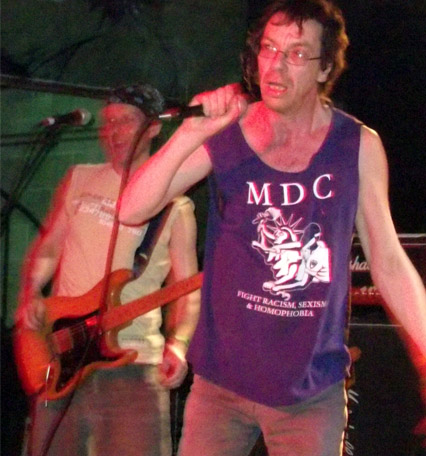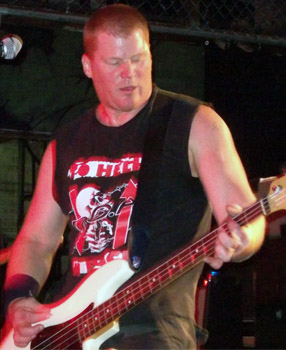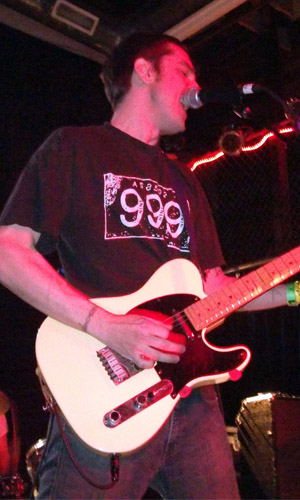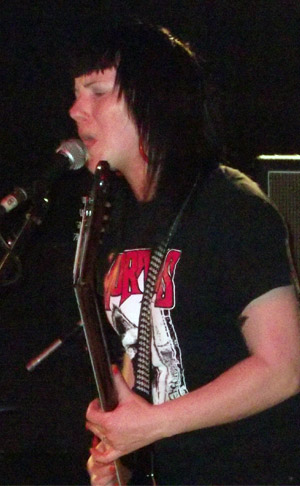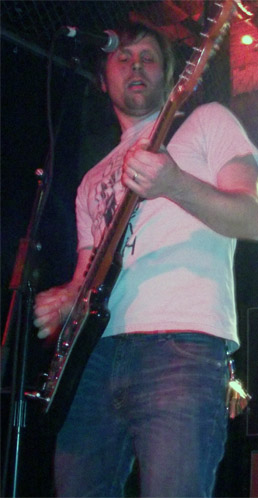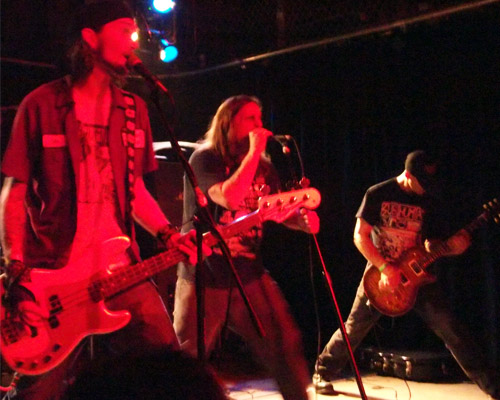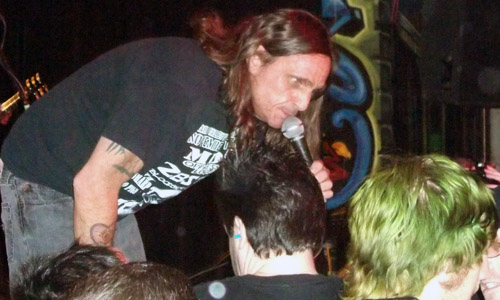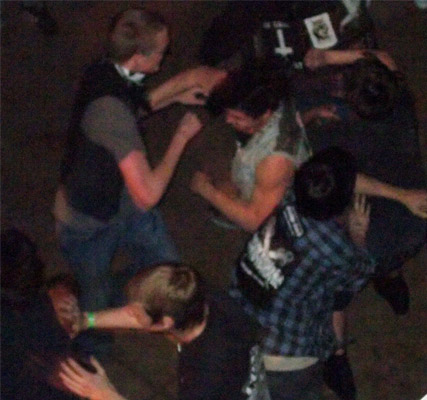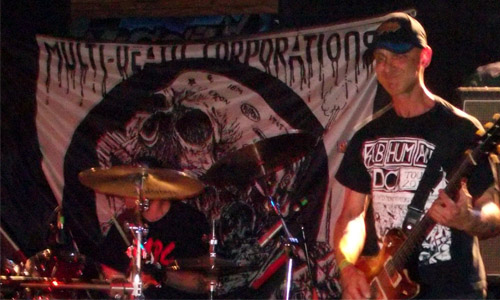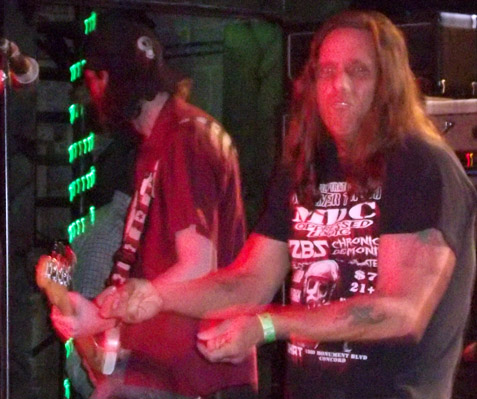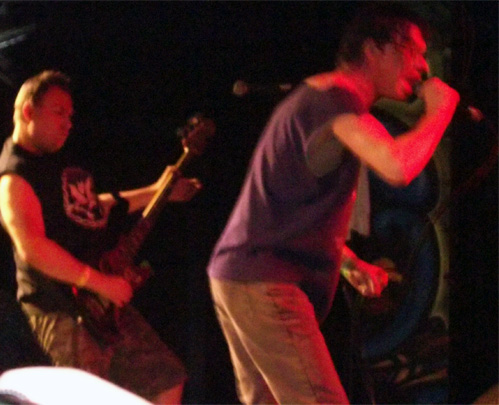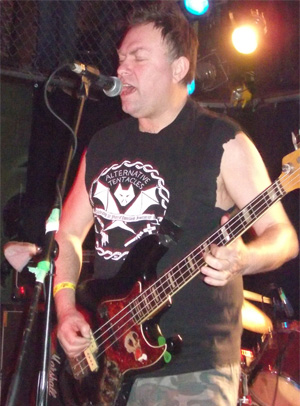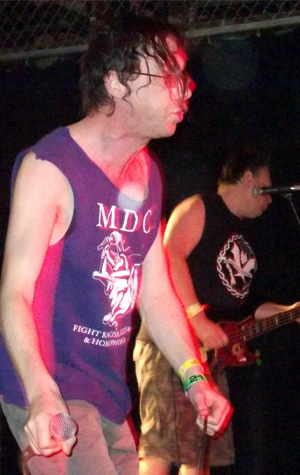Interview: Dick Lucas Of The Subhumans
By aaroncynic in Arts & Entertainment on Apr 15, 2011 7:00PM
No matter how many generations of former mohawked individuals say the phrase “punk is dead,” there’s always someone to take their place. Wednesday night, young and old punks alike crowded Reggie’s in the south loop for veteran DIY punks the Subhumans and MDC, along with two fantastic local openers, Daylight Robbery and the Neutron Bombs. We also had a chance to sit down for an interview with Dick Lucas of the Subhumans.
CHICAGOIST: The first record of yours I bought was The Day The Country Died when I was 14 or 15. I bought it based on the fact that I saw the album cover and saw the band name painted on people’s jackets. Is that kind of musical discovery, just grabbing something on a whim, still possible today?
DICK LUCAS: Not as much because there’s hardly any record stores anymore to browse through record covers and think “oh that looks good.” I’ve done it myself, selected what album to buy next when there wasn’t a chance to hear much of it, because you’re living in a small town or whatever. You’d just go to your local record store, flip through everything and say “well, this looks like it could sound good.” A good cover really helps on that. If you see patches on people’s jackets and stuff, that would help - it’s cheap advertising. But is it still possible? I guess it is but there are just so few record stores now and browsing online does not have the same effect as having a record sleeve in your hand and turning it over and sort of having that nice little feel to it.
C:Has that kind of technology and the marketing behind it…In some ways I think that technology has helped the DIY community kind of stay connected but it’s also blurred the lines between “I’m touring myself, I’m putting my own records and doing my own shows” and well this is-
DL: Once you’re online and unless where you’re from is specifically written in front of your face and you’ve got a series of album sleeves in front of you, you can’t really tell where bands come from until you play the music. Of course you’ve heard all the music and that’s the advantage of being of online is that you can just flip through iTunes and listen to an endless array of stuff. Most of the DIY stuff isn’t on iTunes. But it’s on Myspace or Facebook or wherever the fuck it is. Is that better or worse? It’s all out there if you can find it, but when you’re assured you’re getting a record from a sort of DIY supplier you sort of feel that you won’t be let down when you actually hear the end result. In some cases though, it could be information overload then. There’s so much of this stuff going on and the blur between DIY and indie and the blur between indie and corporate is getting pretty muddy.
C: And I think that’s what I’m kind of getting at, that those lines have blurred so much over the past 10 to 20 years…
DL: The true independent nature of a band will come across in lyrics and their artwork than in the music, I think. A band could play any style of music you like but if they’re singing about anarchy or government or war that’s one thing. If they’re singing about love songs and beer that’s entirely another thing.
C: With that kind of marketing and all that and those lines being so blurred, has that kind of politically or socially conscious mentality of a band become another marketing tool Something like “I’m selling you the idea of rebellion in the form of punk rock.”
DL: It’s always been like that but that’s quite a sort of jaded way of putting it really. Of course, anywhere you try to sell anything by any means it is saying “I’m trying to sell you this rebellion, I’m trying to sell you anti-capitalist thoughts.” It’s all so twisted when you think of it like that. Ideally nobody should be selling anything. We’ve entered the world of downloads where a lot of music is for free so in a way that’s a good thing. The whole nature of selling stuff goes against (inaudible) because money shouldn’t really be important, but we live in a society and on a planet where it is important to have some of it. You certainly can’t get anywhere or do anything or feed yourself (without it).
That aside, it depends how much of a marketing ploy you use, how much you want to saturate. With the internet you can just put your record out there to people who will tell other people about it on blogs or comments on Youtube and in that way it sort of generates its own advertising. When it comes down to the same sort of thing if you like a band you’ll want to wear their patch or you put a blog comment up saying “this band is great, this record’s great go and buy it now.” Good music will generate its own success. It doesn’t take large advertising budgets to do it anymore. So that’s a good thing. It’s leveled the playing field in that sense between Michael Jackson and a bunch of 14 year old kids doing their first seven inch. They’ve both got the chance to appeal to as many people as the other because it’s a level playing field because it’s all on a screen that anyone can access.
C: I read this interview with you guys a few months back where you called yourselves “punk rock for people who think punk is dead,” which I thought was hilarious. People have been saying that since well before I was born-
DL: Since ’79 when the Sex Pistols split up.
C: So does punk rock or any form of music really die or does the culture just evolve and change and is it still alive but just in a different form?
DL: It definitely evolves and changes and goes back to its basic roots now and again and gets the life sucked out if it by corporations once every sort of 15 years. They all say “this punk rock stuff these days is getting quite marketable, let’s reinvent it and stick it out to another generation of 15 year old kids,” who hear their first punk rock record when say, they hear Rancid on TV. It’s just like hearing the Buzzcocks on Top of the Pops, but 20 years later. It does go in cycles like that, but when it was going on the second cycle there was so much more to it behind that.
The first cycle sort of capitalized on the idea that the only way to do music was to be on a record label who would sell your product, buy TV ads and mass radio play. After that, Crass brought a notion of making your own records, paying for it all, doing your own sleeve, paying for this and paying for that, but no contracts, and selling it as cheap as possible. The whole idea just unleashed a whole bunch of bands doing exactly the same thing. Record companies lost their notion of control over the whole process. That was a great evolutionary step.
The other evolutionary step was to involve more styles of music. Metal would cross over with punk. Punk crossed over with what became New Wave. There were punk bands that sort of stuck to the original 4/4 medium paced sped up rock, like the Clash or Pistols. Then a whole bunch of it got sped up by Discharge then Napalm Death, which was a bit of a downward evolutionary spiral because a lot of punk bands these days just start off playing as fast as possible and don’t really go any further than that. They think that that’s the ultimate thing punk bands represent musically, that you’ve just got to be fast, really in your face and blunt and it’s lost a lot of subtlety and excitement for me, at least, by doing that. Punk doesn’t have to be basic. But it’s nice because it can be basic and anyone can do it.
C: Is it more difficult for a band - at some point you start playing fast and tough and then you say “we can do other things, so let’s do it.” When you start doing that, is it harder for a band to do that because people say “this isn’t the same thing. These guys sold out or these guys suck now.”
DL: That’s worrying too much about what people think. The intensity and the fun of actually playing it live will just come across to people that you actually still mean it and unless you suddenly change in the meantime, it doesn’t mean you’re doing it because someone told you to do it in order to appeal to more people. Going from one style completely into another style will lose fans and gain fans, I suppose. But if you start off by playing all your songs at the same speed and just variations on a theme and then you start to get varied, people will lose interest…if you start varied, no one can complain later on.
C: One of my favorite songs has always been Human Error. It’s always had a day after kind of feel to it. At this point politically, you can take that theme and literally change the references to Vietnam or Belfast and just change those identifying places and we’re still sitting in the same places on a global perspective. It’s not Vietnam now…
DL: There’s a bomb going off in Beirut, there’s a bomb going off in Cairo, there’s a bomb going off in Libya, you know, you can change the places…
C: But the kind of themes still stay the same. So on that level is humanity going to ever learn from that kind of behavior or are we just doomed to keep changing the names of the places until we run out of places to bomb?
DL: That’s a wide question.
C: I guess I’m asking because it’s a question I ask myself everyday. That’s the kind of thing I wake up in the morning going “what else is going to happen now?” There’s always some shit but it seems when you look back on how things were in decades past, there’s always some kind of shit.
DL: Ever since you were ever born and a lot of times before that. With the invention of mobilized armory and then bombs there’s just been wars everywhere. The people with the most bombs bomb those with the most resources.
C: I guess at some point you would - with everything happening throughout the Middle East - every revolution seems to install another government that has similar interests with changing names.
DL: It could lead to civil war between tribal parties. That’s the latest theory about the Libyan situation at the moment. That if Gaddafi went everyone would separate back to their own tribes - east or west, I don’t know what the tribes are. It would just become civil war for power in the whole country.
C: You would think that people might say, “we’ve done this before, we’ve seen this before historically”
DL: But there’s always greed and the hunger for power. People want it. People say no, we started this we want the power. A country might divide into two perhaps, or they’ll just fight each other forever or they might just get together somehow but who’s going to bring them all together to decide who’s to lead them is the real sticky bit.
C: So is that cyclical lust for power or authority human nature or a result of scarcity of resources and/or greed?
DL: Both I guess. Whoever’s got the guns gets the resources. But all the resources of the planet are enough to feed everybody and we could just take the money out of the arms trade and suddenly everyone’s got enough to eat. But that’s idealism for you. When it comes down to it, is it human nature? I hate the idea that greed and warfare is human nature. I suppose it could be. It’s animal instinct to protect your own territory. After that, is it animal instinct to get more of it or is it animal instinct to keep your own territory and just be pacified or peaceful and protect against invaders? But who’s doing the invading? Is it just mankind who upped the anti invasions rather than be happy with what he’s already got? That might just be the case.
C: You would think most people who have resources, food on their table, a roof over their head, maybe a couple bucks in the bank, there’s not much you need to worry about after that. The drive to grab more is just selfish.
DL: Really selfish, yeah. When you talk about people in government, bankers who have got all the money and all the power already, at least locally, what motivates them to…I dunno, it’s oil you’d think. They’ll go out and grab the space where the oil lies underneath it to keep their whole economy running the way it always has been. But that’s what they say. In the end they’ve got all the money they want, they’ve got all the ambition fulfilled, they’ve got all the power they’ve got, they’ve got all the TV stations they could ever buy…in the end it’s just selfish, ruthless people.
C: A lot of your songs, and so many punk songs and themes have had an apocalyptic feel to them - why is it that people are always so interested in the end of the world?
DL: Because they secretly want it to end. Their life is shit and boring and dull and controlled from so many fucking angles and nothing changes. No matter what happens it’d be great to see the whole thing crumble and see what happened after that. It’d be a massive playground adventure where everybody’s equal all of a sudden. It’s kind of a childish way of looking at it, perhaps, that if you cut it all down to nothing and start again that maybe we’d be better. I mean childish in that a child would think those things in a more considered sense.
C: When you’re a kid and you’re playing with building blocks you just knock it all down and start again.
DL: Also the churches, the Christians especially, they go on about the end times and all that just to keep people mentally enslaved to keep funding their coffers and turning up for church and leading good lives. Leading a good life is a good thing, but you shouldn’t have to pay for the right to do it by being subservient to the notion of going to hell or heaven or whatever after it’s over.
C: Music as kind of a vehicle for social change, is that still effective?
DL: People come up to me and say “your music changed my life.” I think really? You sure it wasn’t you that changed your life? People say these things and music does have an effect. I’m not claiming *our* music specifically has the effect of changing your life. That would be a bit too much. But people do take something out of good lyrics and good songs. It was probably in them already, but they hadn’t really realized it. That’s what happened to me in punk rock. You’ve got the Adverts singing a song like “Bored Teenagers” and I’m thinking “Wow, I’m a bored teenager, that’s exactly what I am! Nice one.” Someone else is thinking this, then you suddenly feel more included in something rather then alone or alienated from society. You get a whole generation of kids coming up thinking “wow, these bands are talking to me using words that are inside me but I didn’t express before because there was no outlet for them there was no mirror reflecting back what I was thinking.”
There’s a lot of self contained, nervous, pissed off, upset, depressed people who just need some outside encouragement to realize that they do stand or sit on an equal ground with a lot of other people. We just happen to be playing really good music at the same time. Music’s a great thing to get into. It’s a good social lubricant. It pulls people together and they have a good time with it. If there’s an over current of good ideas mixed in with that then suddenly it produces fanzines, ideas, discussion and debate. Alternative ideas come out and people can just build things on that if they feel like doing more than just repeating and quite a lot of people do.
